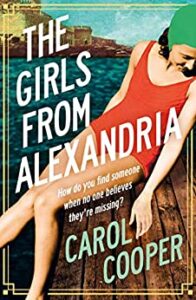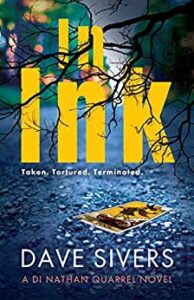Lisa Hobman’s Under an Island Skye, reviewed by Morton S Grey
I loved this book and wanted to make my own escape to the Isle of Skye! Tackles some difficult issues – bereavement, depression, divorce, children of divorce but in a way that carries you along wanting the characters to find their happiness. Believable characters especially the hero, Reid and the heroine, Juliette. Evin and Chewie the dog wormed their way into my heart. A lovely escapist read.
 Carol Cooper’s The Girls from Alexandria, reviewed by Jessie Cahalin
Carol Cooper’s The Girls from Alexandria, reviewed by Jessie Cahalin
The mystery of Nadia’s missing sister hooked me from the outset. There are many layers in this book. Set in Egypt, London and in a London hospital ward, this novel explores the impact of one’s culture life experiences on our identity. The insight into life in Alexandria intrigued me and I could feel the exotic heat of Cairo. I enjoyed the contrast between the voices of Nadia as a girl and a mature woman. The naïve girl becomes a wise and witty woman, and the impact of her past on the present is explored beautifully. The way Nadia makes sense of a patriarchal and disrupted society is enlightening and relevant: revisiting memories sparks new connections and insight. The novel kept me guessing about Nadia’s sister and Nadia’s illness. There are wonderful gems of wisdom sprinkled throughout this novel. An intelligent novel I know I will reread.
Readers who enjoy Maggie O’Farell’s The Vanishing Act of Esme Lennox will love this book.
Natasha Lester’s The Paris Secret, reviewed by Jill Barry
Skilfully plotted, beautifully written, and with a cast of fascinating and ‘real’ characters, this dual time novel is a joy to read. Word pictures of Cornwall, the sensation of becoming airborne, the loneliness and horror of the war years against the camaraderie and determination to enjoy being young and alive, all contribute to this magnificent novel with its tiers of separation and reunion, even if the latter is sometimes not entirely welcome. Family secrets and historical facts blend with real life dramas. Devotees of haute couture will drool over the name dropping and the exquisite descriptions of dresses most of us can only dream of acquiring. This is a book you won’t want to put down. This is a love story that will stay with you long after you regretfully reach The End.
 David Sivers’ In Ink, reviewed by Evonne Wareham
David Sivers’ In Ink, reviewed by Evonne Wareham
Dave Sivers is an established indie/self published crime author specialising in police procedurals. In Ink is the first in a new series in which a murder team under DI Nathan Quarrel investigates a serial killer in the leafy and affluent communities around Tring. When the body of a middle aged accountant turns up in a churchyard with a macabre facial disfigurement Quarrel’s team have to unravel a scheme for vengeance from a killer who is a meticulous planner and who always seems one jump ahead. Why have the victims been chosen and what is the significance to the killer of tattoos and tarot cards? A twisty plot, a policeman with a haunting act of violence in his own past, a killer with a grisly calling card and a cast of interesting characters – both police and suspects – make this a satisfying read.



